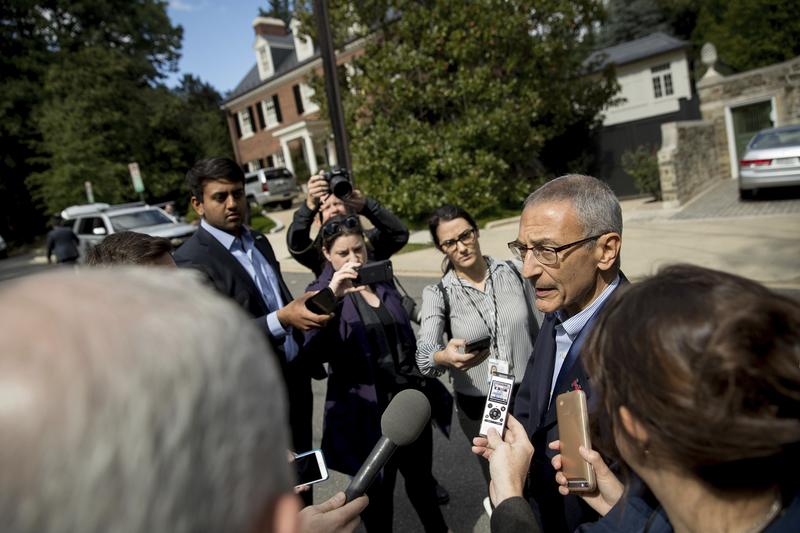BROOKE GLADSTONE: From WNYC in New York, this is On the Media. I’m Brooke Gladstone.
BOB GARFIELD: And I'm Bob Garfield. The Donald Trump campaign is cratering but evidently it's not his fault.
[CLIP]:
DONALD TRUMP: The election is being rigged by corrupt media pushing completely false allegations and outright lies in an effort to elect her president.
[END CLIP]
BOB GARFIELD: Please, obviously, sour grapes and a figment of a demented imagination, except for the part of it that's true. I know at least one journalist who, back during the primaries, begged his colleagues to gang up against the surging Trump.
[CLIP]:
BOB GARFIELD: Every interview with Donald Trump, every single one, should hold him accountable for bigotry, incitement, juvenile conduct and blithe contempt for the Constitution. The voters will do what the voters will do, but it must not be, cannot be because the press did not do enough.
[END CLIP]
BOB GARFIELD: Back in May, I was agitating for the media to cover the election, not like the usual horse race but like an approaching killer storm, to document his hate speech and debunk his lies, not, pointedly, to go easy on Hillary Clinton but to meticulously rake the endless Trump muck because at stake was our very democracy. Much journalistic eye rolling ensued, but after Trump won the Republican nomination the coverage did get more hostile. News stories and analysis called out the lies, columnists and editorialists raged against him. The same media that built Trump’s 24/7 publicity platform turned it into a gallows, if only by quoting his words and reporting facts.
[CLIPS]:
MALE CORRESPONDENT: - 3 am tweets and an obsession with the 1996 Miss Universe.
MALE CORRESPONDENT: He brought a portrait of himself with tax-deductible money.
FEMALE CORRESPONDENT: And when Hillary Clinton accused him of paying no income tax during Monday's debate, Trump said, quote, “That would make me smart.”
[END CLIP]
BOB GARFIELD: Again, obviously, the same press has also dutifully covered Clinton's emails, Goldman Sachs speeches, trade deal flip-flops and the Clinton Foundation to a fare-thee-well, but certainly they buried Trump. And now, through the courtesy, it seems, of Vladimir Putin and WikiLeaks, we learn of an apparently cozy relationship between political reporters and the Clinton campaign. In the WikiLeaks dump, reporters from The New York Times and Politico were revealed to have allowed the campaign to choose which quotes from otherwise off-the-record conversations would be permissible to publish.
Politico's Glenn Thrush submitted whole story passages about Campaign Chairman John Podesta to John Podesta for review, noting mordantly in an email, quote, “Because I have become a hack, I will send you the whole section that pertains to you. Please don't share or tell anyone I did this” - sad. But, despite Trump’s trumps paranoiac accusations, this doesn't really constitute collusion. It's merely an infuriatingly common and completely bipartisan inside-the-Beltway game of trading deference for access. And it’s also indefensible, giving story subjects the opportunity to shape and soften the coverage. No scoop is worth the surrender of journalistic independence, as observed in 2012 on this program by UC Berkeley Graduate School of Journalism Dean Edward Wasserman.
DEAN EDWARD WASSERMAN: I think at this point you’re no longer talking about an interview; you’re talking about a press release. And what happens is Washington becomes no different from Beijing, in terms of reporting what authorities want reported.
[END CLIP]
BOB GARFIELD: I personally am prepared to defend my anti-Trump crusade as a rare historic necessity, in the face of a hundred-year storm.
[MUSIC UP & UNDER]
Even New York Times Executive Editor Dean Baquet has said that Trumpery forced journalists to recalibrate how we deal with politicians’ naked lies. But when business as usual becomes exhibit A in the accusation of media collusion, it's high time to change business as usual.
[MUSIC, MUSIC OUT]


